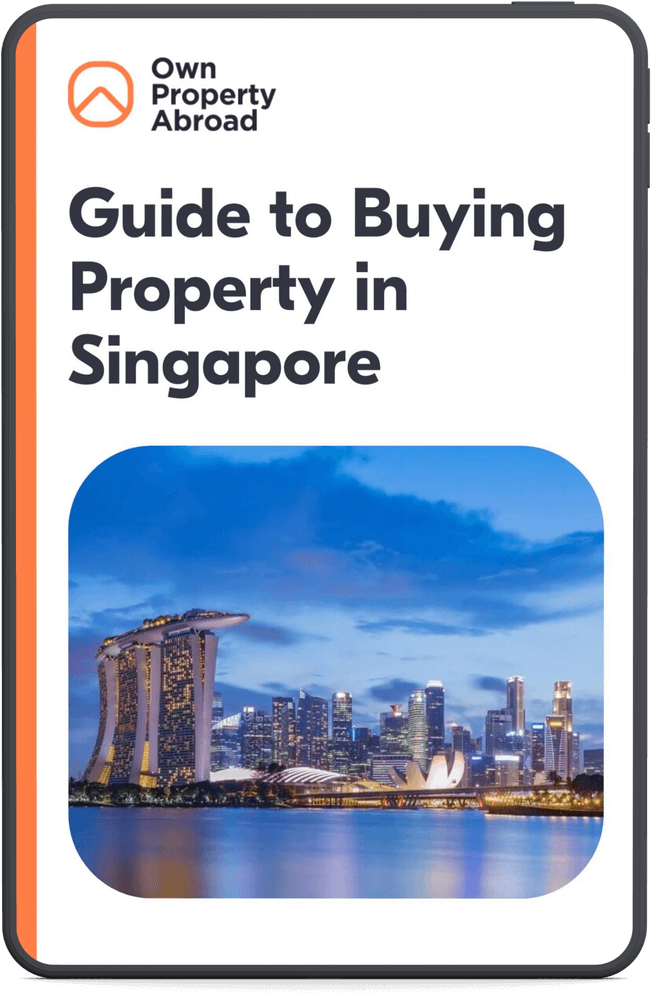Buyer’s Stamp Duty (BSD)
One of the property taxes in Singapore that foreigners must account for when purchasing real estate is the Buyer’s Stamp Duty (BSD). This property stamp duty in Singapore is a tax imposed on the documented purchase of properties, calculated based on the higher of the property’s purchase price or market value.
The Buyer’s Stamp Duty in Singapore rates are structured progressively applicable to all types of real estate:
- First SGD 180,000 ($135,180) – Taxed at 1%
- Next SGD 180,000 ($135,180) – Taxed at 2%
- Next SGD 640,000 ($480,640) – Taxed at 3%
- Amount exceeding SGD 1 million ($751,000) – Taxed at 4%
You must ensure that this property tax in Singapore is stamped and paid within 14 days after the document’s execution date if signed within Singapore. If the document is signed overseas, it must be done within 30 days of receipt in Singapore.
Additional Buyer’s Stamp Duty (ABSD)
The government has revised the Additional Buyer’s Stamp Duty (ABSD) rates, effective April 27, 2023. Understanding the new structure of property taxes in Singapore is essential when investing in residential property. Here are the Additional Buyer’s Stamp Duty (ABSD):
- Entities and living trusts: Entities that include corporations, associations, and individuals transferring residential property into a living trust will now be subject to an ABSD of 65%.
- Housing developers: The ABSD rate has been adjusted to 35% for housing developers. However, an additional 5% is non-remittable. This portion cannot be claimed back and represents a direct cost to property developers, likely influencing the property market dynamics and new property launches.
- Foreign buyers: The Additional Buyer’s Stamp Duty for foreigners in Singapore will increase to 60%, which applies to a substantial luxury residential market segment.
- Singapore Permanent Residents (PRs): Singapore PRs purchasing their first residential property will be subject to a 5% ABSD. A 30% property tax in Singapore is required for those purchasing a second residential property, and 35% ABSD is imposed on those purchasing a third residential property.
- Singapore citizens: ABSD property tax in Singapore is not applicable when purchasing their first residential property. However, an ABSD of 20% must be considered for those considering a second home. A third and subsequent property purchase attracts a rate of 30%.
Seller’s Stamp Duty (SSD)
Seller’s Stamp Duty in Singapore is a tax imposed on residential property sellers who choose to dispose of their property within a specified timeframe after purchase. This property tax in Singapore is designed to discourage the speculative buying and selling of properties. Here is how the Seller’s Stamp Duty in Singapore rates are structured for residential properties:
- 12% SSD rate is applicable if the property is sold within one year of purchase.
- 8% SSD is charged if the property is disposed of more than one year but less than two years from the date of purchase.
- 4% SSD applies if the property is sold after two years but within three years of purchase.
Valuable insights and practical advice, distilled from years of expertise and real-world experience.


Property Tax
Property tax in Singapore is a tax imposed on property owners. Singapore property tax rates are calculated based on the property’s Annual Value (AV), which estimates its potential rental income annually. Residential properties are taxed at different rates depending on whether they are owner-occupied or non-owner-occupied. Below is the breakdown of the Singapore property tax rates for residential and non-residential properties effective January 1, 2024.
Owner-occupied residential properties
Property tax rates are significantly lower for homes that their owners occupy. The following rates apply:
- First SGD 8,000 ($6,008): 0%
- Next SGD 22,000 ($16,522): 4%
- Next SGD 10,000 ($7,510): 6%
- Next SGD 15,000 ($11,265): 10%
- Next SGD 15,000 ($11,265): 14%
- Next SGD 15,000 ($11,265): 20%
- Next SGD 15,000 ($11,265): 26%
- Above SGD 100,000 ($75,100): 32%
Non-owner-occupied residential properties
Rental properties or homes not occupied by the owner are subjected to higher tax rates. The rates are as follows:
- First SGD 30,000 ($22,530):12%
- Next SGD 15,000 ($11,265): 20%
- Next SGD 15,000 ($11,265): 28%
- Above SGD 60,000 ($45,060): 36%
Commercial property tax in Singapore
Commercial and industrial buildings, along with land not used for residential purposes, incur a tax rate of 10% based on their Annual Value. The Singapore commercial property tax rate applies regardless of whether the properties are purchased for personal use or occupation, as owner-occupier tax rates do not apply to non-residential properties.
Rental income tax
Rental income is a typical income many property owners earn by renting out their property. Taxes on rental income in Singapore generally stem from different sources associated with the rental property, such as:
- Rent payments for the use of the premises.
- Maintenance fees that tenants may pay as part of their rental agreement.
- Income from renting furniture and fittings if these are included in the rental.
- Rental deposits: Typically, these are not taxable unless forfeited. For instance, if a tenant forfeits a deposit due to property damage, this becomes part of your gross rent and, hence, is taxable. Expenses incurred in repairing damages can be deducted.
- Subletting: This income is also taxable if you rent out part of a property (like a room in your house). Expenses must be apportioned based on the portion of the property being rented out.
- Recovery from insurance: Any insurance payout related to the rented property is taxable.
Income tax applies to the net rental income, calculated after subtracting any permitted expenses. Taxes on rental income in Singapore occur based on when the rental income becomes due and payable to the property owner rather than the actual date of receipt.
Property tax in Singapore for rental income is treated differently based on property ownership:
- Sole ownership: If you solely own the property, you are taxed on 100% of the rental income, regardless of whether someone else receives the rent on your behalf.
- Joint ownership: For jointly owned properties, rental income (and potential rental losses) are divided among the owners according to their legal share of the property, irrespective of who physically collects the rent.
Non-residents and foreigners in Singapore are required to pay personal income tax on any rental income earned within the country. The following outlines two income tax forms applicable to non-residents who face a 22% property tax rate in Singapore on their rental earnings.
- Employment income: 15%
- Director’s/consultation fees, rental income, and all others: 22%
Taxes on foreign property owners
Foreign property owners and investors contemplating purchasing properties must be aware of the specific rules and real estate taxes in Singapore that apply to them. Here are the taxes on foreign property owners:
- Additional Buyer’s Stamp Duty (ABSD): The ABSD Singapore for foreigners is imposed on top of the usual Buyer’s Stamp Duty (BSD). The Additional Buyer’s Stamp Duty for foreigners in Singapore who buy any residential property is 60%.
- Buyer’s Stamp Duty (BSD): The property stamp duty in Singapore applies to all property purchases in Singapore and is based on the property’s purchase price or market value, whichever is higher. The Buyer’s Stamp Duty in Singapore is progressive and can range from 1% to 4%.
- Seller’s Stamp Duty (SSD): If you decide to sell your property within the first three years of ownership, you’ll also be subject to the SSD property tax in Singapore, which ranges from 12% to 4%, depending on the holding period.
- Property tax: Annual foreign ownership property tax in Singapore applies to both foreign and local property owners. The rate varies depending on whether the property is owner-occupied or rented out, with higher rates applying to rental properties.
Property ownership rules for foreigners
Singapore has specific ownership rules for foreigners that are crucial to understand before making any property investment. Foreigners (non-Singapore citizens or non-permanent residents) can purchase certain property types without seeking prior approval. These include:
- Condominium units
- Executive condominiums (subject to certain conditions)
However, foreign buyers are generally restricted from purchasing landed property and vacant residential land. Purchasing such properties requires explicit approval from the Singapore Land Authority, and criteria include the buyer’s permanent residency status and contributions to the Singaporean economy.
Valuable insights and practical advice, distilled from years of expertise and real-world experience.


Frequently Asked Questions (FAQs)
How much is the property tax for foreigners in Singapore?
Property tax for foreigners in Singapore for owner-occupied properties ranges from 0% to 32%, depending on the value, while non-owner-occupied properties are taxed at rates ranging from 12% to 36%.
What is Buyer’s Stamp Duty (BSD) in Singapore, and how is it calculated?
Buyer’s Stamp Duty (BSD) in Singapore is a tax on property purchases, calculated using progressive rates on the higher of the property’s purchase price or market value: 1% on the first SGD 180,000 ($135,180), 2% on the following SGD 180,000 ($135,180), 3% on the following SGD 640,000 ($480,640), and 4% on any amount exceeding SGD 1 million ($751,000).
What is Additional Buyer’s Stamp Duty (ABSD), and who needs to pay it?
The Additional Buyer’s Stamp Duty (ABSD) is a tax imposed on certain buyers of residential property in Singapore, including foreigners, entities like corporations and living trusts, housing developers, Singapore Permanent Residents (PRs), and Singapore citizens purchasing more than one property. Rates vary based on the buyer’s status and the number of properties owned.
What are the property tax rates for owner-occupied vs. non-owner-occupied properties in Singapore?
The property tax rates for owner-occupied residential properties in Singapore are progressive, from 0% to 32% for amounts above SGD 100,000 ($75,100). Non-owner-occupied residential properties are taxed at higher rates, beginning at 12% for the first SGD 30,000 ($22,530) and reaching up to 36% for amounts above SGD 60,000 ($45,060).
How is rental income taxed in Singapore?
Rental income is taxed in Singapore as part of the owner’s total personal income. It includes payments for premises use, maintenance, furnishings, and potentially forfeited deposits. Expenses are deductible, and they are taxable when due, not when received.
Do foreigners pay higher property taxes in Singapore?
Yes, foreigners pay higher property taxes in Singapore through a 60% Additional Buyer’s Stamp Duty (ABSD). ABSD Singapore is a significant cost consideration for foreigners and cannot be overlooked.
How is property tax calculated in Singapore?
Property tax for residential properties in Singapore is calculated based on the property’s Annual Value. Different foreign ownership property taxes in Singapore apply to owner-occupied and non-owner-occupied properties, ranging from 0% to 32% and 12% to 36%, respectively.



